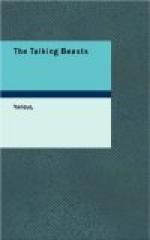The Falcon and the Capon
A Capon, who had strong reasons for thinking that the time of his sacrifice was near at hand, carefully avoided coming into close quarters with any of the farm servants or domestics of the estate on which he lived. A glimpse that he had once caught of the kitchen, with its blazing fire, and the head cook, like an executioner, with a formidable knife chopping off the heads of some of his companions, had been sufficient to keep him ever after in dread.
Hence, one day when he was wanted for roasting, all calling, clucking, and coaxing of the cook’s assistants were in vain.
“How deaf and dull you must be,” said a Falcon to the Capon, “not to hear when you are called, or to see when you are wanted! You should take pattern by me. I never let my master call me twice.”
“Ah,” answered the Capon, “if Falcons were called like Capons, to be run upon a spit and set before the kitchen fire, they would be just as slow to come and just as hard of hearing as I am now.”
The Crow and the Pitcher
A Crow, ready to die with thirst, flew with joy to a Pitcher, hoping to find some water in it.
He found some there, to be sure, but only a little drop at the bottom which he was quite unable to reach.
He then tried to overturn the Pitcher, but it was too heavy. So he gathered up some pebbles, with which the ground near was covered and, taking them one by one in his beak, dropped them into the Pitcher.
By this means the water gradually reached the top, and he was enabled to drink at his ease.
The Eagle and the Owl
The Eagle and the Owl, after many quarrels, swore that they would be fast friends forever, and that they would never harm each other’s children.
“But do you know my little ones?” said the Owl. “If you do not, I fear it will go hard with them when you find them.”
“Nay, then, I do not,” replied the Eagle.
“The greater your loss,” said the Owl; “They are the sweetest prettiest things in the world. Such bright eyes! such charming plumage! such winning little ways! You’ll know them now from my description.”
A short time after the Eagle found the owlets in a hollow tree.
“These hideous little staring frights, at any rate, cannot be neighbour Owl’s delicious pets,” said the Eagle; “so I may make away with them without the least misgiving.”
The Owl, finding her young ones gone, loaded the Eagle with reproaches.
“Nay,” answered the Eagle, “blame yourself rather than me. If you paint with such flattering colours, it is not my fault if I do not recognize your portraits.”
The Buffoon and the Countryman
On the occasion of some festivities that were given by a Roman nobleman, a Merry-Andrew of a fellow caused much laughter by his tricks upon the stage, and, more than all, by his imitation of the squeaking of a Pig, which seemed to the hearers so real that they called for it again and again.




